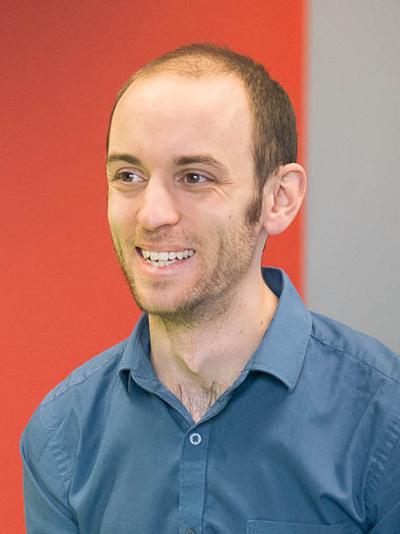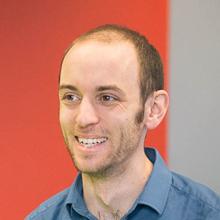Royal Academy awards Research Fellowship to Southampton Biomedical Engineer

Dr Alex Dickinson, a University of Southampton early career academic whose research aims to develop more comfortable and durable prosthetic limbs for amputees, has been awarded a prestigious Research Fellowship by the Royal Academy of Engineering (RAEng).
These highly competitive fellowships provide financial support and mentoring for five years to outstanding researchers, to establish independent careers in research that are useful to industry and or society, or have genuine high-growth potential in either a new product or service.
Dr Dickinson, a New Frontiers Fellow in the University’s Bioengineering Science Research Group, was awarded the Research Fellowship for his work on prosthetic biomechanics. His objective is to develop prosthesis design and clinical assessment tools which will assist engineers and prosthetists in producing more comfortable, better performing replacement limbs for amputees.
Dr Dickinson said: “I am thrilled to have an opportunity to launch this exciting and important research programme, which will deliver results for engineering in the UK and Europe, and for amputees worldwide. It will be an honour to complete it as a representative of the Royal Academy of Engineering.”
Around 5000 major amputations are carried out every year in the UK, and despite the development of advanced prosthetic limb technologies, the level of mobility achievable is strongly dependent on successful rehabilitation after surgery, and on optimal fitting of a prosthetic limb. Producing a comfortable and functional socket fit is a challenge; the residual limb’s size fluctuates over the course of each day due to changes in temperature, activity and hydration, and longer term due to deterioration of the reconstructed soft tissues. If the socket fit is not perfect, pressure and shear stress in the soft tissues can cause discomfort or even deep tissue injury, reducing mobility or compromising recovery.
Dr Dickinson said: “I will develop accurate models of the interaction between the residual limb and the prosthetic socket in lower limb amputees, based on state-of-the-art imaging and gait analysis techniques. This will allow me to predict how the residual tissues deform and respond to the loads generated in activities of daily living. These models will incorporate the daily size variations and long-term adaptation of the stump, and the considerable influence of variability between patients.
“The aim is to predict the response of the residual limb in order to develop surgical and prosthetic treatments that speed up and reduce the discomfort of rehabilitation.”
Part of a long-established research tradition in Assistive, Adaptive and Rehabilitation Technologies at the University of Southampton, this work will benefit healthcare providers by increasing the time prosthetic limbs last between adjustments or replacements, and will ultimately improve the quality of life of lower limb amputees. Dr Dickinson’s fellowship reinforces a collaboration with the Biomechatronic Systems Group at Fraunhofer IPA, Stuttgart, and he is working with leading surgeons, rehabilitation physiotherapists and small/medium enterprises to translate the research into the clinic.
Professor Ric Parker CBE FREng, Director of Research and Technology, Rolls-Royce Group, and Chair of the Academy’s Research and Secondments Committee, said: “Innovation is crucial to keep the UK ahead of its competitors in today’s highly competitive globalised market, and it is thanks to the work of outstanding researchers such as the recipients of this year’s Research Fellowships that the country can develop and maintain a technological advantage.”
Related Staff Member
Other University of Southampton sites
Links to external websites
The University cannot accept responsibility for external websites.
Notes for editors
1. The Royal Academy of Engineering Research Fellowships are designed to promote excellence in engineering. They provide support for high-quality engineers and encourage them to develop successful academic research careers.
2. As the UK’s national academy for engineering, the Royal Academy of Engineering brings together the most successful and talented engineers for a shared purpose: to advance and promote excellence in engineering.
It provides analysis and policy support to promote the UK’s role as a great place to do business. It takes a lead on engineering education and invest in the UK’s world-class research base to underpin innovation. It works to improve public awareness and understanding of engineering. It is a national academy with a global outlook.
3. Through world-leading research and enterprise activities, the University of Southampton connects with businesses to create real-world solutions to global issues. Through its educational offering, it works with partners around the world to offer relevant, flexible education, which trains students for jobs not even thought of. This connectivity is what sets Southampton apart from the rest; we make connections and change the world. https://www.southampton.ac.uk/
https://www.southampton.ac.uk/weareconnected
#weareconnected
For more information:
Glenn Harris, Media Relations, University of Southampton, Tel 023 8059 3212, email G.Harris@soton.ac.uk, Twitter: @glennh75
www.soton.ac.uk/mediacentre/
Follow us on twitter: http://twitter.com/unisouthampton
Like us on Facebook: www.facebook.com/unisouthampton
